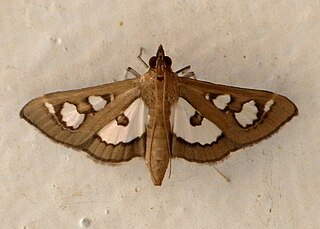Related Research Articles

Hilda Lucia Solis is an American politician and a member of the Los Angeles County Board of Supervisors for the 1st district. Solis previously served as the 25th United States Secretary of Labor from 2009 to 2013, as part of the administration of President Barack Obama. She is a member of the Democratic Party and served in the United States House of Representatives from 2001 to 2009, representing the 31st and 32nd congressional districts of California that include East Los Angeles and the San Gabriel Valley.

Cossoidea is the superfamily of moths that includes carpenter moths and relatives. Like their likely sister group Sesioidea they are internal feeders and have spiny pupae with moveable segments to allow them to extrude out of their exit holes in stems and trunks during emergence of the adult.

Marco Antonio Solís Sosa is a Mexican musician, singer, composer, actor, and record producer.

Omiodes is a moth genus in the family Crambidae. Several species are endemic to Hawaii.

Omiodes odontosticta is a species of moth in the family Crambidae. It was first described by George Hampson in 1898 and is found Australia in Northern Territory and Queensland.
Omiodes meyricki is a species of moth in the family Crambidae. It was described by Charles Swinhoe in 1907 and is found on Sulawesi in Indonesia.
Omiodes simialis is a moth in the family Crambidae. It was described by Achille Guenée in 1854. It is found in Brazil, Venezuela, French Guiana, the West Indies, Honduras, Costa Rica and Florida.
Omiodes chloromochla is a moth in the family Crambidae. It was described by Edward Meyrick in 1936. It is found in the Democratic Republic of the Congo.
Omiodes hallwachsae is a moth in the family Crambidae. It was described by Patricia Gentili-Poole and Maria Alma Solis in 1998. It is found in Costa Rica. It was named in honor of biologist Winifred Hallwachs.
Omiodes insolutalis is a moth in the family Crambidae. It was described by Heinrich Benno Möschler in 1890. It is found in Puerto Rico and Costa Rica.
Omiodes janzeni is a moth in the family Crambidae. It was described by Patricia Gentili-Poole and Maria Alma Solis in 1998. It is found in Costa Rica.
Omiodes martyralis is a moth in the family Crambidae. It was described by Julius Lederer in 1863. It is found in Argentina, Venezuela, Brazil, Puerto Rico, Costa Rica and Mexico.
Omiodes metricalis is a moth in the family Crambidae. It was described by Heinrich Benno Möschler in 1881. It is found in Suriname.

Omiodes noctescens is a moth in the family Crambidae. It was described by Frederic Moore in 1888. It is found in India, China Korea, Japan and Taiwan.
Omiodes ochracea is a moth in the family Crambidae. It was described by Patricia Gentili-Poole and Maria Alma Solis in 1998. It is found in Costa Rica.
Omiodes similis is a moth in the family Crambidae. It was described by Frederic Moore in 1885. It is found in Sri Lanka and China.
Omiodes sirena is a moth in the family Crambidae. It was described by Patricia Gentili-Poole and Maria Alma Solis in 1998. It is found in Costa Rica.
Omiodes annubilata is a moth in the family Crambidae. It was described by Charles Swinhoe in 1894. It is found in India.
Omiodes fuscipennis is a moth in the family Crambidae. It was described by Charles Swinhoe in 1894. It is found in Meghalaya, India.
Omiodes pernitescens is a moth in the family Crambidae. It was described by Charles Swinhoe in 1894. It is found in Meghalaya, India and China.
References
- ↑ Nuss, M.; et al. (2003–2017). "GlobIZ search". Global Information System on Pyraloidea. Retrieved June 2, 2018.
- ↑ Savela, Markku. "Omiodes pseudocuniculalis Solis & Gentili, 2000". Lepidoptera and Some Other Life Forms. Retrieved June 2, 2018.
| This Omiodes-related article is a stub. You can help Wikipedia by expanding it. |